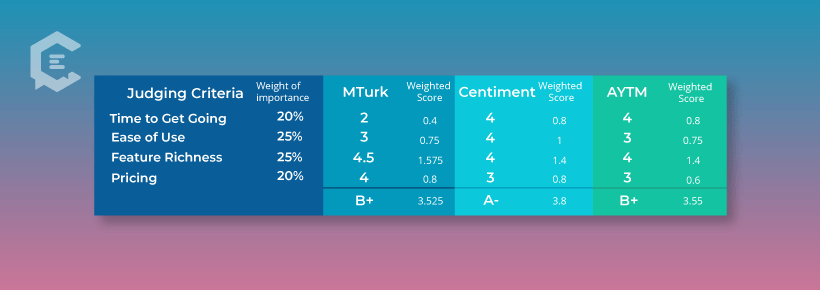What is a survey panel? Having a well-built survey is important, but having a well-targeted group of people to take your survey is imperative. A survey panel is a group of people you have access to who can fill in your survey and help you find the answers to your business questions. Leveraging a pre-existing survey panel is important as it allows you to do more research, gain insights faster, and get higher response rates.
It’s no secret that “remote” has become the “new normal,” at least for the foreseeable future. As a result, businesses and organizations worldwide are forced to operate differently. In many cases, businesses have had to think outside the box, get creative, and leverage new tools and technology to continue to be productive.
As we explained in Part 1, many businesses that are focused on developing and launching a new product, or improving an existing product by launching new features, must now run remote focus groups, and are trying to figure out the best way to do this.
What is the purpose of focus groups?
If you missed Part 1, focus groups are often used to help businesses research and brainstorm new product ideas or new features to add to an existing product. Working with a focus group allows them to gather feedback and insights, as well as consider the risks of a particular product or feature.
Focus groups involve subject matter experts or key stakeholders that work with a product development or marketing team to help provide advice, feedback, or expert judgment on a product or feature idea as well as provide financial, political, or other support.
In short, focus groups help with the following:
- Brainstorm or discuss ideas
- Gather initial feedback and impressions of those ideas
- Identify potential concerns or risks
- Research and understand users’ expectations of a new product or feature
- Review any initial wireframes, mockups, product roadmaps, prototypes, or storyboards
- Verify the MVP of a particular product or feature
All in all, focus groups can also help marketing and development teams work through challenges or obstacles in the research process. However, now that focus groups must work remotely, many product development and marketing teams began leveraging online survey respondent panel tools to conduct surveys.
How we review each survey respondent panel option
To ensure we conduct fair reviews of each product, we use the following criteria:
- Feature richness. What features are available? Are the features helpful? Do the features provide value for the cost?
- Time to get going. It can be overwhelming to set up surveys, think of all the questions you want to ask, and test each survey before launch. How easy is it to set up your survey using this tool?
- Ease of use. How easy is it to use the tool?
- Price. How much does the platform cost? What is the overall cost versus value?
At the end of this article, we will provide an overall grade, show a grading rubric summary and declare the “winner” of the three survey respondent panel options based on the criteria we have mapped out above.
Deep Dive: MTurk
Amazon Mechanical Turk (MTurk) is a crowdsourcing marketplace that allows individuals and businesses to outsource numerous processes and tasks, including survey research. MTurk also allows users to gather global insights, streamline processes, collect data, and more, all with the power of machine learning development.
Crowdsourcing is an excellent way to connect with a global network of potential survey respondents that will be able to provide an honest, unbiased opinion of a product idea or feature. Although MTurk is a great tool, it is definitely different when compared with some of the other survey respondent panel options we will review.
MTurk pros:
Feature richness. Users can do a lot with MTurk. It is easy to set up and get started. Users can set up their surveys, publish the survey link as a “task,” and access a database of potential survey respondents. MTurk also allows users to manage and qualify survey respondents to ensure they are a good fit for their surveys. This step is incredibly important to ensure that survey results are accurate and aren’t skewed in any way.
Ease of use. MTurk itself is fairly easy and straightforward to use in regard to setting up and publishing a survey, “vetting,” and qualifying survey respondents, and collecting data.
However, one thing to keep in mind is if you want to keep track of who starts and completes your survey, or other relative data or analytics on a third-party dashboard, then you will need to set up a completion code that links to your external data analytics tool. This can get a little complicated, depending on your data analytics dashboard or system.
Price. One of the biggest benefits of MTurk is the price. Users can control their spending and overhead costs by dictating how much they want to compensate survey respondents for participating in their surveys. So, whether teams choose to compensate $3 per survey or $30, users have greater control over total costs.
MTurk cons:
Time to get going. Although the MTurk setup process is relatively easy, it can be a little time-consuming and complex for some users, depending on the length of the survey, of course. MTurk can take anywhere between 15 to 30 minutes to completely set up and publish a survey link. This might be quick for some users, but time-consuming for others.
MTurk also doesn’t offer live chat or support, so users are on their own for setting up, publishing surveys, and collecting data. However, MTurk does offer a help center, FAQs, and other resources to help users get started.
As a result, MTurk might not be the best option for new teams or users who are setting up online surveys for the first time. MTurk might be a bit time-consuming and complex, resulting in more setup time than some of the other tools we will review.
Grade: B+ (3.53 out of 5 possible points)
Deep Dive: Centiment
Centiment is a survey respondent tool that is specifically designed for market research. What makes Centiment different from the other survey respondent panel tools that we will review in this article is that rather than it being a DIY tool, users have the opportunity to work with a team of survey professionals through Centiment to launch a survey.
Furthermore, Centiment allows users to target a specific demographic, age, industry, income level, education, and many other characteristics. This allows users to get super granular and specific on target audience demographics for better and more accurate survey results.
Centiment pros:
Feature richness. Centiment offers users a variety of options yet still keeping the user interface easy and straightforward. The tool also has integrations available with some of the most popular survey tools, including Qualtrics, Survey Monkey, Typeform, and more. So, if you already have your survey built in a third-party tool, a quick connection with Centiment’s API will get your survey locked and loaded, and ready for review. With Centiment, you don’t have to reinvent the wheel. Furthermore, many users claim that Centiment is one of the best survey respondent panel tools available — and for an attractive price. The staff and support team is responsive, helpful, and knowledgeable in terms of the best methods for conducting survey research, which is great for users who are new to conducting surveys or working with remote focus groups.
Time to get going. Aside from working with a live representative, Centiment is incredibly easy to set up and get started. Users simply build a survey with the survey tool of their choice, submit the finished survey product to the Centiment team for review, and analyze and collect survey responses. Centiment also provides users and focus groups with real-time survey results, so users always know exactly who is taking their surveys and what the responses look like at any point in time.
Ease of use. As mentioned in the “time to get going” point above, Centiment is very easy to use. Working with a live Centiment representative makes the process that much easier, smoother, and enjoyable. Centiment is by far the best option for users or focus groups who are new to conducting survey research. Centiment makes the process as easy as possible, eliminating the guesswork and allowing users and focus groups to make more informed decisions about product ideas and/or features.
Centiment cons:
Price. Although Centiment makes the mark on all criteria, price is a little hard to come by. Centiment doesn’t advertise its pricing, but rather requires new users to request a quote. As a result, pricing likely depends on a multitude of factors, such as the size and length of a survey, the desired audience size, and more.
Grade: A- (3.8 out of 5 possible points)
Deep dive: AYTM
AYTM is the third and final survey respondent tool we will review in this article. AYTM claims to be an advanced yet easy-to-use survey platform. AYTM focuses on delivering an excellent survey experience more than the logistics of survey research. It provides users and focus groups with both a DIY platform and also offers live support for those teams that are new to conducting surveys.
Additionally, AYTM allows users to design and build their survey directly in the platform without the need for a third-party survey creation tool, such as Qualtrics or Survey Monkey. With AYTM, you can design, develop, and deliver your survey all from one dashboard.
AYTM pros:
Feature richness. AYTM certainly isn’t short on robust features. From advanced targeting capabilities to design, build, and program survey tools to providing actionable market insights, users can do it all with AYTM. Even though AYTM offers a wealth of features, users claim that this survey respondent panel tool makes research flexible and easy.
Time to get going. After reviewing a handful of user reviews, AYTM offers an incredibly easy and highly intuitive user interface that makes the time to get going easy, fast, and smooth, without any special training or tutorials. However, AYTM does offer a resources section that provides various how-to guides and articles, a help center, and demo videos for users who want to make the most from the AYTM platform.
AYTM cons:
Price. Similar to what we saw in our review of Centiment, AYTM also doesn’t advertise its pricing. Users who are interested in AYTM should contact their customer support team for a free, custom quote. Again, pricing will likely depend on various factors, including survey size, length, and audience size and demographics. The advantage of this is that users and focus groups will be able to reduce and control overhead costs using any survey research or survey respondent panel tool rather than compensating survey respondents individually, which can be significantly more cost-effective.
Ease of use. Although AYTM offers a number of great features and capabilities, the survey builder has a little bit of a learning curve, specifically the custom survey logic. According to some users, AYTM doesn’t offer many resources on this bit, which can take more time than necessary to set up a survey. However, AYTM has implemented an auto-complete feature to help with this quirk.
Grade: B+ (3.55 out of 5 possible points)
Scaling resources for focus groups
As we mentioned in Part 1 of this article, it’s incredibly important for marketing and development teams to be able to scale resources, especially in today’s current climate where resources are lacking.
Scaling resources will ensure your teams and workforce have what they need to do their jobs and run focus groups remotely. Therefore, using a survey respondent panel tool is a great way to leverage third-party tools and resources in order to continue to run effective remote focus groups.
Survey respondent panel tool: The winner
After reviewing three great online survey respondent panel tools — MTurk, Centiment, and AYTM — we believe Centiment is the winner. Centiment offers a number of great features, capabilities, and live support, all designed to help teams design and deliver awesome surveys to focus group and survey participants.
Regardless of whether you are a pro or new to conducting surveys or product research and working with focus groups, Centiment is ready to provide you any level of support that you need.
Although Centiment doesn’t provide any pricing details, a quick call to the support team will provide you with a free quote as well as next steps for getting started. As a result, we have declared Centiment “the winner” with an “A.”






